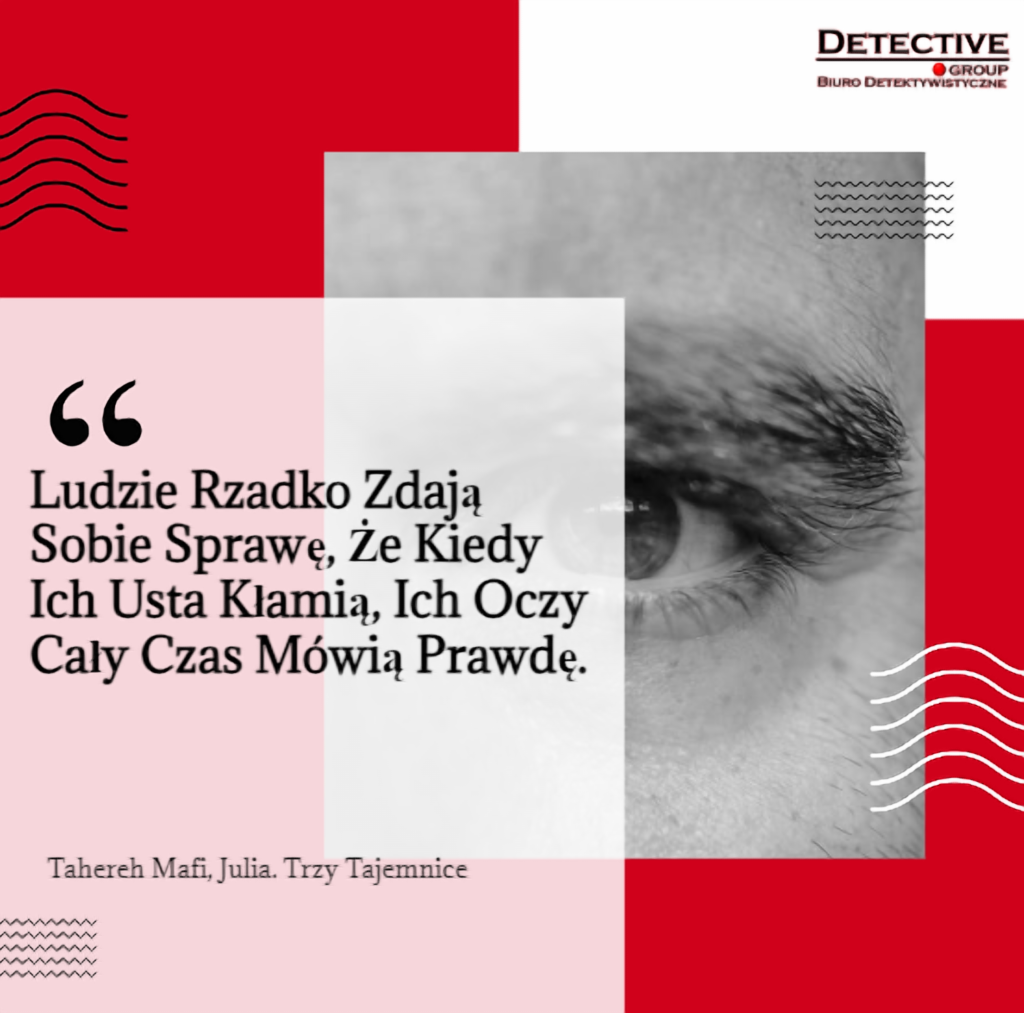Data: 04.07.2023
|Autor: Detective Group
How to recognize a lie in a relationship? At Detective Group Detective Agency, we very often come across issues raised by our clients regarding the broad definition of a lie.
Some people, before reporting their problem to us, usually first take action on their own to verify the validity of their suspicions about their spouse or partner. Often, this does not help them at all. What's more... Their suspicions usually grew stronger at that time. What could they have done? How to recognize a lie? See the signs of lying in a relationship !
To be careful, you should prepare for this in advance and try to recognize a liar by checking in the ways described below.
Here are the most popular ones:
How to recognize a liar ? The facial expression of a person who is not telling the truth acts as a polygraph, or lie detector. By observing deviations from the usual facial expression, one can determine a lack of sincerity. Which gestures indicate that a person is distorting the facts?

They say that the eyes are the mirror of the soul. Few people know that the voice – its tone, timbre and intensity – is also a perfect reflection of the emotions that are consuming the individual. The sounds that a person hears are transmitted to the limbic system, which is responsible for processing emotions. Thanks to the processes taking place in the body, people can easily determine how another person is feeling based on their voice alone. This innate ability is very helpful when unmasking a liar.

In a situation like this, there are still some signals that may indicate a lie – more formal language or more detail than usual in a statement.
This sometimes works even in the case of written messages – it should be noted that, for example, it is alarming when someone starts a statement with “I swear” or “To be honest…
There are already studies on lies used on WhatsApp – and according to them, messages containing the word "I'll try", for example, often turn out to be lies .
Often when someone says they’ll try to do something, they’re simply too scared to admit they won’t. Usually when someone says they’ll “try to come to the party… they usually don’t come.
When we talk about reading body language, we are actually mostly mind reading. Most often we learn patterns, for example, that if someone scratches their nose three times in a row, it can be a clue that they are lying. However, it is only a clue , not proof of lying.
We learn to "read minds" or interpret body language unconsciously throughout our lives. During recruitment, 80-90% of decisions are made by recruiters before the interview even begins. We often unconsciously judge job candidates by the way they stand, move or smile. The body is faster than words, which often perfectly mask true intentions.
It is important to remember that patterns are just guidelines . Making the mistake of overinterpreting , e.g. assuming that the other person is lying because they happened to touch their nose, puts us in the same situation as someone who has never learned body language. Or even worse.
The conclusion is that incorrectly administered knowledge can have the opposite effect to that intended.
The basic method consists of three elements: observing basic reactions, discovering so-called actves and asking masterful questions. The first condition for success is to devote a sufficient amount of time to observing the selected person in a natural situation, when they are rested and relaxed. How they sit, how they gesticulate, how they speak, when we ask everyday questions such as: "what's up?", "how are the children?", "how was your weekend?". With this knowledge, we can move on to the second stage - detecting actives, i.e. possible differences between basic reactions and how this person will behave during a conversation about things that are important to us.
For example, we ask: "what did you do there yesterday? " If we notice that the other person starts behaving differently, we may be talking about the first hints of a lie. Then it is time for additional questions that will verify our assumptions.
If it is a business relationship, we can ask: "Could you tell us more about this? ", " How do you understand this?" . This will give us the opportunity to follow up.
In a close relationship we can say: "something doesn't seem right about your answer, please explain it to me" or "could you tell me more about it?" , "how do you understand it?" . A great question is when there are hints of deceit, it's simple: "really?". It forces the other person to continue on a topic that is probably uncomfortable for them, increasing their tension.
First, we pay attention to vocabulary and the way someone speaks: slips of the tongue, speaking in the third person, repeating questions, all of which are intended to buy the liar time and make up a story.
Secondly, we observe the face and head, for example whether nodding or denying confirms or challenges the speaker's words.
The third element is observing the whole body. In a stressful situation, some people lean back, symbolically trying to escape, others lean in tension, suggesting an attack, and still others freeze, trying to disconnect from the difficult situation. You can pay attention to the legs, which both the liar and the observer pay the least attention to. Feet pointing out can indicate that someone has had enough of the conversation. By observing a group of friends, we can notice who likes whom the most, because their feet will be facing each other.

One way is to make a contract at the beginning of the conversation: " Can we agree that you will tell the truth?" It is unlikely that someone will refuse. And when they do agree, then - according to research - we increase the chance of hearing the truth by as much as 80 percent.
However, we are sometimes lied to. Sometimes by people who do it every day, such as dishonest salespeople, politicians, or financial advisors. How can we avoid being fooled?
– Studies show that we lie in every fifth social situation, and in every third by the age of 25. Some people lie really well. However, there are signals that give away even good liars. This is because, among other things, the limbic system in the brain is responsible for action, not thinking.
It operates outside of our awareness, and one of its tasks is to reflect the emotions we feel on our face. They are expressed in microexpressions, or movements of the so-called credible facial muscles that last 0.1–0.2 seconds. Credible precisely because we are unable to control them.
One of the characteristic microexpressions is a slight upward movement of one corner of the mouth, expressing disapproval or contempt. To make sure that this was a reaction to what was being said and not, for example, a sudden toothache, you need to ask a so-called master question, in English called a powerful question. Its purpose is to confirm that we have correctly read the activa and to obtain true information from the interlocutor. Such a question might be, for example, " is this okay with you, or are there elements in my attitude that you did not entirely like? " An open question will increase the likelihood that I will hear what is really going on.
On the contrary. A liar must remember the story he made up, connect the dots, remember which of his friends know each other, because they could have passed on this false information. He must observe the other person to know whether they have already “bought” the lie. That is why lying is a huge effort. And fortunately, because people who want to recognize whether someone is telling the truth have a chance to do so thanks to this very effort. The limbic system supports the expression of truth, so deception involves physical effort – a liar must cover up the signals naturally sent by the body. All my knowledge and experience related to body language make me not want to lie. The reason is pragmatic: it is simply very inconvenient. I prefer to construct my life in such a way that I tell the truth. Do I always do it? No.
Studies show that as many as 80% of lies are never revealed . Among other reasons, we don't want to know the truth, we're not prepared for it. Many people don't want to learn body language; they say, "but I don't want to know everything!" I'd like to know everything so that I can do what I want with it.
We use patterns without verifying signals. For example, we assume that a person who sits with their hands folded is closed. In the meantime, they may be cold, for example. Some people use superficial information and make incorrect interpretations based on it, for example, they consider looking away as a sign of lying. They do not know that for cultural reasons women look away because it is not always appropriate for them to look someone in the eye all the time. Big mistakes are wrong intentions - focusing on finding signals of insincerity, which will always appear - and separating the three-step procedure that we talked about - we will not determine deviations from the basic behavior if we have not learned this behavior.
If you have become suspicious about your wife's sincerity or you have become suspicious about your husband's sincerity, contact the Detective Group Detective Agency in Warsaw. We will help you verify the sincerity and fidelity of your life partners.
About the effective observation of a private detective (here).
Before your consultation, check out our customer reviews (here).
kontakt@detectivegroup.pl (contact box)
tel. 725-587-801 or 725-587-802